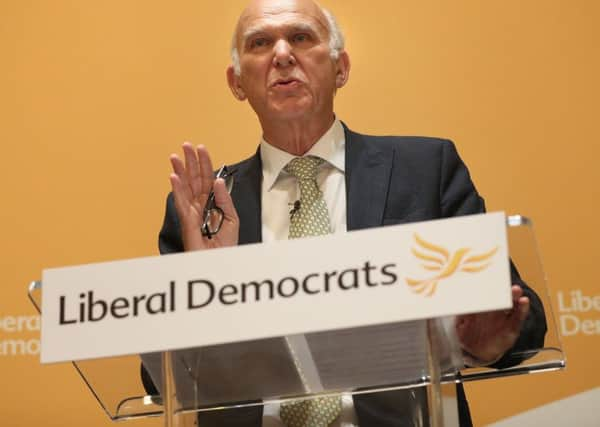Sir Vince Cable: We need to get organised quickly over our EU exit


But Barnsley, Hull, Doncaster, rural areas and coastal resorts mostly voted Leave. There was a similar split across the Pennines where Manchester, Liverpool and Lancaster voted Remain and most of the rest voted Leave. These divisions, across country and county, are proving deep and painful.
Politics have also become very polarised between ideologues of Left and Right to a degree I cannot previously recall. But the divisions in Parliament are along different lines to those in the country. On the particular issue of Brexit, Theresa May and Jeremy Corbyn are working hand in glove.
Advertisement
Hide AdAdvertisement
Hide AdWe have a weird, improbable, coalition between these extremes to produce a ‘hard’ Brexit removing Britain from the Single Market and the customs union, and much else. The opposition is within the two main parties and from my party (and the Scottish nationalists) and also from the main business groups and the trades union movement.
We haven’t yet left the EU and the consequences are only slowly becoming apparent. If the Government continues to pursue the idea of a two or three-year transition we will still operate under EU rules until 2022, even though we have left and have no say over what happens. So we would experience a crash in slow motion: but a crash nonetheless. Some of us will continue to argue that it makes more sense to use the steering wheel as well as the brakes and avoid the crash altogether.
But whatever happens it makes sense to try to plan ahead and look at the scenarios which could emerge. In Birmingham, the Combined Authority is working with Birmingham City University to do some Brexit planning. I would hope that Leeds and Sheffield, perhaps together, are doing the same. There are some obvious points of vulnerability: companies with major export business in the EU; manufacturing companies which are part of EU supply chains and depend on continuation of the customs union; universities, which stand to lose research funding, staff and students; farmers, who face greater competition with less support; local infrastructure projects which rely on EU Structural Funds.
There are some obvious gainers too: tourist resorts which benefit from a cheaper pound attracting visitors (provided they do not also depend on EU staff). Whatever does happen over Brexit, there should be common ground in strengthening the Yorkshire economy in a variety of ways. First I would like to see life breathed into the Northern Powerhouse. Because George Osborne patented this phrase it is sometimes assumed it has vanished with him into the Evening Standard. That would be unfortunate.
Advertisement
Hide AdAdvertisement
Hide AdThe idea is a good one: building up the infrastructure of the North so that there is good connectivity from East to West across South Yorkshire and Lancashire potentially building a conurbation to rival London, ie HS3, and also getting on with the Northern leg of HS2. The advocates for prioritising London infrastructure are well organised. The Northern Powerhouse needs to get its act together.
The industrial strategy I launched in 2011 building on the foundations laid by my predecessors – Peter Mandelson and Michael Heseltine – remains a good framework for collaboration between business and government for long-term improvements in productivity. The Advanced Manufacturing ‘catapult’ based in Rotherham and the Process innovation centre on Teesside are key components.
One of the products of the industrial strategy was the progess made in building up a supply chain for new energy technologies and the Siemens turbine plant in Hull is proof of that. The migration of universities from ivory towers into the chain of business innovation – as with Huddersfield, Sheffield and York – is another dimension. One of the positives about Theresa May is that she understood the importance of industrial strategy and has continued it, albeit with less energy. The interface between industrial strategy and devolution is very indistinct.
Brexit will almost certainly aggravate the shortage of skills as Europeans are subject to immigration controls or leave the country worried about long-term security. I presided over a big increase in the quantity and quality of apprenticeships and there has been an encouraging switch from academic university study to degree-level apprenticeships through colleges.
Advertisement
Hide AdAdvertisement
Hide AdOne critical factor will be whether companies are able to raise funding to cope with the adjustment which Brexit will require. Small business has a continuing difficult relationship with banks and regional banks and stock markets are now history. The British Business bank, which I set up to ease these problems, has done valuable work with start-ups and peer-to-peer lending platforms while the Business Growth Fund has been a source of risk capital for growing companies. But good initiatives like the EU-funded Jeremi scheme providing venture capital in the regions will go.
Brexit is likely to be a complex, messy and disruptive process and none of us can be sure how it will end. But since Yorkshire people voted for it, and presumably didn’t vote to be poorer, they and their elected representatives need to get organised – and fast.
Sir Vince Cable is leader of the Liberal Democrats. He was born in York.